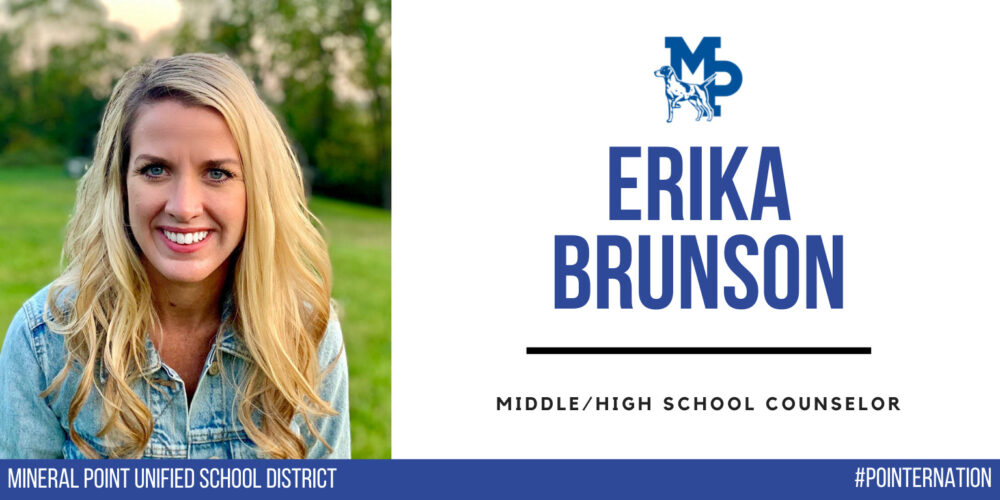
Erika Brunson
Middle/High School Counselor
Hometown: Mineral Point
High school graduated from: Mineral Point
College: Erika earned her Bachelor’s Degree in Psychology with a Minor in Criminal Justice and Spanish from the University of Wisconsin-Platteville. She went on to earn her Master’s in School Counseling, also from UW-Platteville.
Previous employment: Most recently, Erika was the Elementary and High School Counselor in the Dodgeville School District for a total of seven years. Previously, she was an Elementary/Middle School Counselor for the Cuba City School District for three years, as well as a School Counselor for Jefferson Elementary School in the Richland School District for a year.
Family: Erika is married to Merrill, who also works in education, and they have four children Calum (10), Lennie (8), Ruby (6), and Elyn (4) who all attend MPES.
Hobbies/Free time interests: With four children, your hobbies/free time are often centered around their interests, and that is great! I enjoy watching my kids in their activities and learning about their interests; I could tell you all about different types of fishing lures! Things I enjoy personally are cooking, walking, reading, trying to adopt as many animals as possible without my husband knowing, a good campfire, and just some quiet time at home.
What attracted you to apply in #PointerNation?: The school and community spirit. Whether you are in the community, at a school event, or talking with others who work or have children that attend Mineral Point Schools, you can feel the spirit, pride and excitement everyone has for their school. Additionally, I wanted to be a part of a school that saw and valued the importance of the whole child. Seeing kids from a holistic viewpoint, was a school I knew I needed to be a part of. Historically, schools have been primarily focused on academic achievement, often looking past the importance of being ready and able to learn. I wanted to be a part of a system that was ready and willing to give mental health and social/emotional learning as much attention as academic achievement, and also understood that these factors have to be met first, so our students are not only able to learn, but retain their knowledge.
Quotable: Originally, I wrote this statement before I accepted my first position as a school counselor (about 11 years ago). As I reread my original thoughts, I believed a lot of it to be true, but knew I had learned so much more as a result of my experiences. Here is a piece of my original sentiments:
“I believe education opens many doors and opportunities for people of all ages. In addition to education, guidance and counseling further encourages chances of success in academic, career and social/emotional problem solving. It is my philosophy that these three factors all work together and are dependent upon one another. If struggles arise in any of these three areas, you will find difficulty in the other two. It is my desire to help students make sense of these struggles and overcome them by using the skills I have acquired through my education and experiences.”
Since working as a school counselor for some time, there are some additions I need to make to this. First, is the importance of building and sustaining relationships with students, staff, parents and the community. These relationships are interdependent upon one another and are vital to the success of our students, our school and the overall school counseling program. This is most effectively accomplished through non-judgemental, reflective listening. I have had the opportunity to strengthen these skills as a result of eleven years in the field of school counseling, as well as previous experiences within social services fields. Sustained rapport with others leads to trust and that is a fundamental foundation that helps not only the therapeutic process with students, but also strengthens the communication and collaboration with colleagues, families and the community.
Second, is the importance of mental health literacy and social/emotional learning. These are the foundations to being life ready. If we want our students to be able to persevere through unavoidable challenges, manage their reactions to strong emotions and seek help when they need it, it is vital to engage in conversations that allow students to know they are not alone in their thoughts and feelings, and that it is ok to talk about it.
Finally, we are all seeking a common goal – students who are college, career, and/or life ready. Through collaboration and development of individualized plans for each student, we can help students find the intersection of their skills and interests. With ongoing conversations and amendments to their individualized plan, we can feel confident sending them out into the world ready to thrive.

